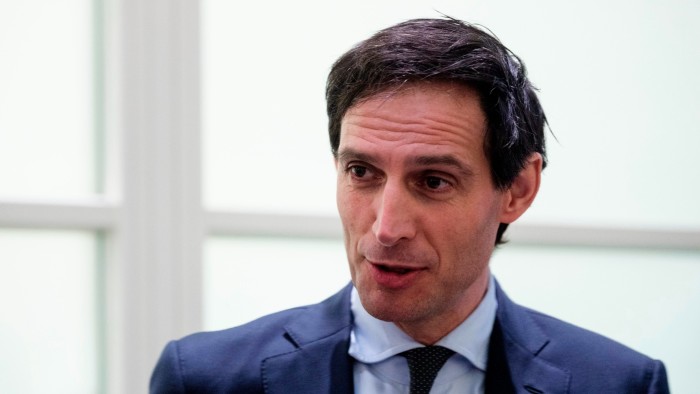Stay informed with free updates
Simply sign up to the Climate change myFT Digest — delivered directly to your inbox.
Climate change will “quadruple” the likelihood of conflict over scarce resources, the EU’s climate chief has warned.
Wopke Hoekstra told the Financial Times that he had been contacted by senior military staff over the past year wanting to “compare notes” on how rising sea levels, droughts, floods and wildfires affect military activities, as well as the potential for migration and resource scarcity to fuel conflict.
“Climate change and its effects have crystal clear direct and indirect effects on geopolitics, on safety and security,” Hoekstra said, ahead of a speech on climate and security at the European Policy Centre economic security forum on Thursday.
“Access to resources has always been part of conflict and warfare. But given the dramatic effects of climate change, this will quadruple the effect.”
The warning comes as the Trump administration seeks to dial down Nato’s focus on climate change as a critical strategic issue.
Previous Nato secretary-general Jens Stoltenberg made climate change a key pillar in his tenure — an effort which now clashes with Trump’s view that climate change is neither man-made nor a pressing concern.
Hoekstra is also under pressure to corral EU member states into supporting the bloc’s lofty climate goals, including to be the first net zero continent by 2050.
Economic and military priorities have replaced climate at the top of the EU’s policy agenda amid fears, particularly on the bloc’s eastern flank, of an aggressive Russia.
But Hoekstra argued that the two should go hand-in-hand given the risk of climate-related conflict and the impact of global warming on military activities.
The effects of higher temperatures are already increasing demands on the military. In several EU member states, the army has been called in to help deal with forest fires. In the US, the Department of Defense has previously said that climate change was increasing demand for operations.
At the same time, military forces face challenges ensuring that their equipment and bases can withstand more extreme conditions. US military engineers have estimated that more than 60 per cent of Naval Station Norfolk, the world’s largest naval base in Virginia, could be underwater following violent storms by the second half of this century.
Nato said in 2023 that the increasing number of days of extreme heat in Iraq was impacting its mission there, preventing helicopters from taking off because of the hotter, less dense air and causing dust storms that dramatically reduced visibility.
Hoekstra said that the military should become greener but “it should never be at the expense of their fighting capabilities”.
The discussion on security was broader than decarbonising tanks, he said. The EU, which is between the melting Arctic and the heating Sahel region, had to be mindful of multiple security threats from climate change including resource scarcity, increased migration and dependency on rogue actors such as Russia for critical commodities. These impacts could also fuel extremism and even increase petty crime.
Athens, for example, had seen “a significant increase in burglaries and thefts” during a drought, the former Dutch foreign minister noted.
Europe is the world’s fastest-warming continent. Temperatures in Europe are expected to increase at least 3C by 2050 compared with pre-industrial levels, according to assessments by the European Environment Agency.
2024 was the warmest year on record for the continent, with flooding affecting 413,000 people and killing 335, according to the World Meteorological Organization.
Owing to concerns over water scarcity, the EU proposed its first water savings target on Wednesday.
Hoekstra said that discussions were ongoing over the EU’s next multi-annual budget, due to be proposed this year before coming into effect in 2028, but that policymakers should be mindful of the world that they were planning for.
“The flexibility to adapt is essential,” he said.
Additional reporting by Henry Foy in Hastings
